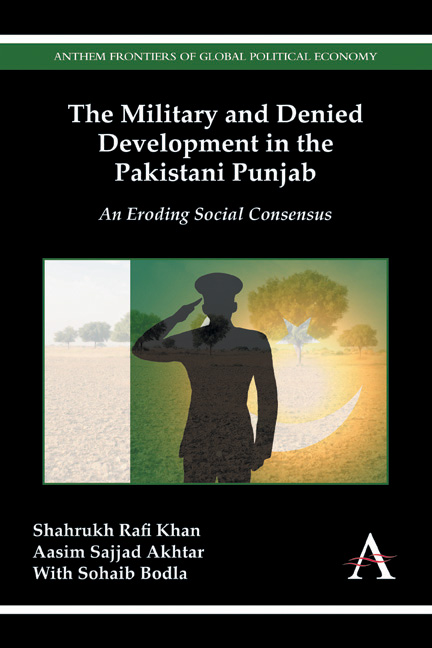Book contents
- Frontmatter
- Dedication
- CONTENTS
- Acknowledgments
- Abbreviations
- Preface
- Chapter One The Military and Economic Development in Pakistan
- Chapter Two Punjab's State–Society Consensus on the Military's Dominance and Economic Role
- Chapter Three Research Design, Method, Institutional Issues and Scope of the Military's Land Acquisitions
- Chapter Four The Military's Agrarian Land Acquisitions: High Handedness and Social Resentment
- Chapter Five From Social Resentment to Social Resistance
- Chapter Six Bahria Town: A Military-Related Real Estate Venture
- Chapter Seven The Military as Landlord in the Pakistani Punjab: Case Study of the Okara Farms
- Chapter Eight Guardians No More? The Breakdown of the Consensus
- Glossary
- Index
Chapter Eight - Guardians No More? The Breakdown of the Consensus
Published online by Cambridge University Press: 05 December 2014
- Frontmatter
- Dedication
- CONTENTS
- Acknowledgments
- Abbreviations
- Preface
- Chapter One The Military and Economic Development in Pakistan
- Chapter Two Punjab's State–Society Consensus on the Military's Dominance and Economic Role
- Chapter Three Research Design, Method, Institutional Issues and Scope of the Military's Land Acquisitions
- Chapter Four The Military's Agrarian Land Acquisitions: High Handedness and Social Resentment
- Chapter Five From Social Resentment to Social Resistance
- Chapter Six Bahria Town: A Military-Related Real Estate Venture
- Chapter Seven The Military as Landlord in the Pakistani Punjab: Case Study of the Okara Farms
- Chapter Eight Guardians No More? The Breakdown of the Consensus
- Glossary
- Index
Summary
Many Pakistani progressives believe that the so-called Punjabi establishment is the single biggest obstacle to political transformation, and in particular, that the cooption of Punjabis – rich and poor alike – explains in large part the continuing domination of the military. We concur with this view, but with qualifications. First, we have insisted that Punjab cannot be considered a monolith; its geography, economy and society is highly varied, in large part due to the revolutionary changes introduced in certain parts of the province during the colonial period. The distinctions created by the British have been reinforced by the postcolonial state, as well as the differential impact of capitalist development. Second, and relatedly, we have argued that class and other social conflicts have been prominent on Punjab's political landscape throughout the modern period. As the military's voracious resource grabbing has come to the fore, some of these previously latent conflicts have been laid increasingly bare.
While providing a selective summary of our main findings in this concluding chapter, our main focus will be on offering some tentative answers to the following questions that have emerged through the course of our research. First, if the state–society consensus over the military's mythic role is really fracturing, could it be that it only breaks down where ordinary people come face to face with military personnel who are involved in self-aggrandizement (by capturing land and associated resources) and not where there is no direct contact between the military and ordinary people? In other words, is there a duality in the public view between the military as economic actor and the military as guardian of national security? Could it be that those who are resisting or feeling resentment against military land acquisitions distinguish those individual (or groups of) officers with whom they come into contact from the military as an institution? Do those violated still feel that the military is the rightful “guardian of the state?” Without the latter being questioned, can the sociopolitical structure be meaningfully transformed?
- Type
- Chapter
- Information
- The Military and Denied Development in the Pakistani PunjabAn Eroding Social Consensus, pp. 129 - 136Publisher: Anthem PressPrint publication year: 2014

